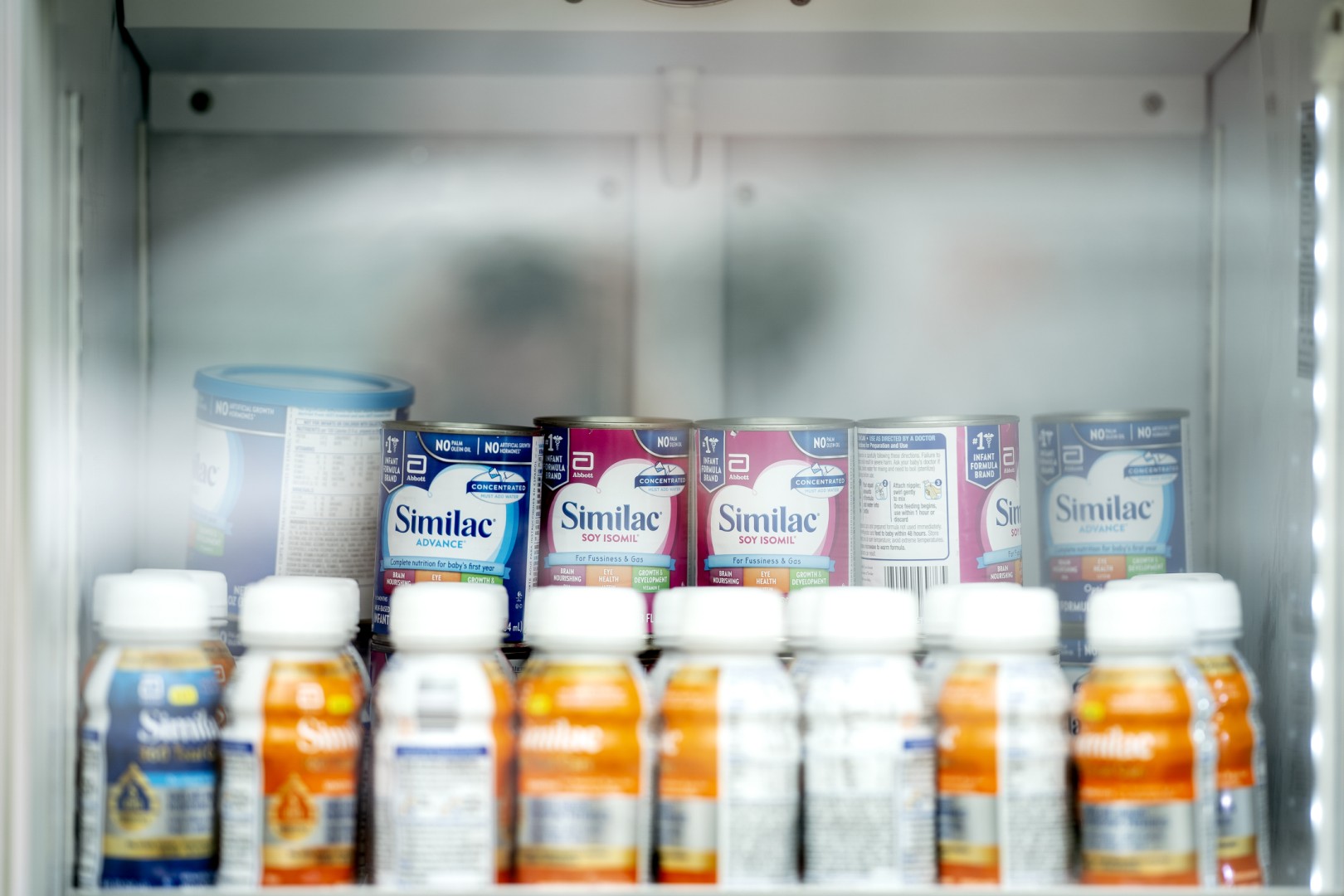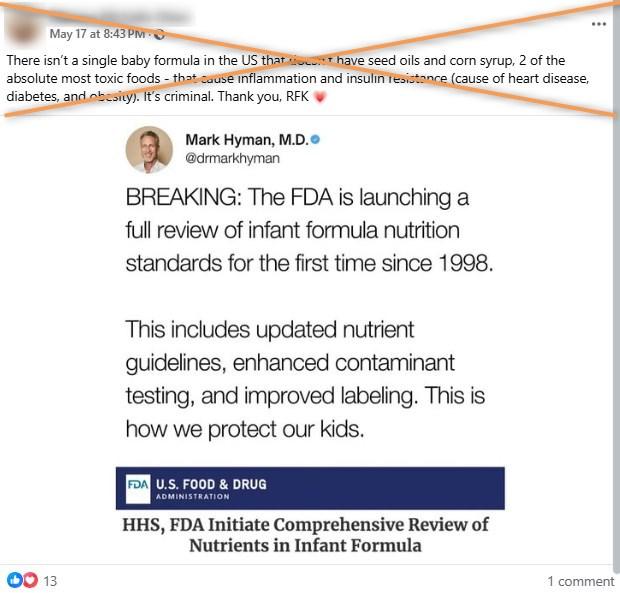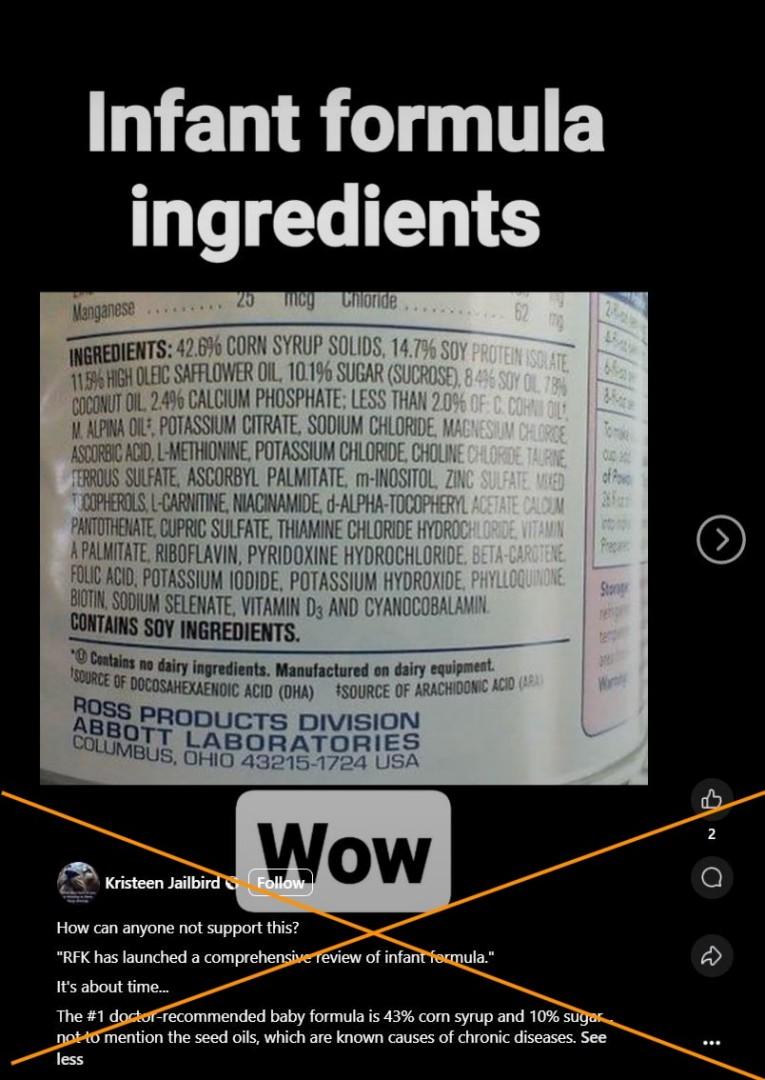
US review of infant formula sparks misleading social media posts
- Published on May 27, 2025 at 23:17
- 4 min read
- By Marisha GOLDHAMER, AFP USA
"Where is the baby formula without seed oils?" asks a man in a video posted to Threads on May 13, 2025.
Others took up the outrage on Facebook, where one post says: "There isn't a single baby formula in the US that doesn't have seed oils and corn syrup, 2 of the absolute most toxic foods - that cause inflammation and insulin resistance."


Similar posts questioning the ingredients of infant formula spread widely after the US Department of Health and Human Services (HHS) and the Food and Drug Administration (FDA) announced a review of nutrients, as well as increased testing for heavy metals and other contaminants.
On its website, the FDA explains that there are "30 nutrients that must be included in infant formulas," with "minimum amounts for all 30 nutrients and maximum amounts for 10 nutrients" (archived here).
HHS said its assessment will be the first comprehensive review of these ingredients since 1998 (archived here).
Research shows that compared with formula, human milk has nutrients that are dynamic and better absorbed by babies (archived here and here). It is strongly recommended as the sole food for the first six months of life (archived here).
But experts have identified systemic issues around paid family leave and support for lactation as barriers to breastfeeding in the United States (archived here).
Independent experts AFP spoke with all backed the formula review as positive, but they said some of the conversation on social media had veered into misinformation.
Steven Abrams, professor of pediatrics at the Dell Medical School at the University of Texas at Austin, told AFP influencers often fail to acknowledge that formula is a "sole-source food," meaning it must provide everything a baby needs (archived here).
While there is no harm in researching alternate ingredients, he said, parents should rest assured that the formula currently on the market is safe for use.
Alarming posts about ingredients often aim to make people feel guilty about using it, Abrams said May 22.
Misinformation can also lead families to try making formula at home, a practice pediatricians and the FDA strongly advise against (archived here).
Sharon Donovan, a professor at University of Illinois Urbana-Champaign (archived here), whose research focuses on pediatric nutrition, said the FDA review will offer the opportunity to incorporate years of research into "human milk composition and how infants digest, absorb, and use nutrients in human milk and infant formulas."
She pointed to iron, which European formulas include at a far lower level than those in the United States as one nutrient to consider reducing.
Seed oils
The social media posts are accurate in stating that formulas in the United States contain seed oils.
But experts say this is not a cause for alarm as the oils mimic the fat content of human milk, providing unsaturated and saturated fatty acids.
"If these were not included in infant formulas, babies would not be receiving their essential fatty acids," Donovan said in a May 23 email.
While most formula companies remove cow milk fat, Donovan said some use whole milk as the starting material for formula, then add smaller amounts of oils to provide fatty acids such as Docosahexaenoic acid (DHA).
Jennifer Smilowitz, an assistant professor at the University of California, Davis who studies nutrition and lactation (archived here), said in a May 23 email that she would recommend more use of this combination to "deliver the digestibility and complexity of human milk fat while meeting infants' requirement for essential fatty acids."
Seed oils are processed at high heat, which can result in contamination with 3-monochloropropane-1,2-diol esters (3-MCPDE) and glycidyl esters. Both have been shown to cause adverse effects including cancer in animal studies (archived here and here).
Given that infants are a vulnerable population, the FDA has worked to measure 3-MCPDE in formula and set an international code of practice to reduce them (archived here).
It says that testing of samples from 2021-2023 from the four largest formula manufacturers showed "levels consistent with levels seen in infant formulas internationally" (archived here).
Prioritize lactose
Other posts on social media decry the use of corn syrup in formula -- and some experts told AFP they do have concerns about the use of added sugar (archived here).

"Our research has highlighted the concerning presence of added sugars in many infant formulas -- particularly glucose and corn syrup solids," said Kai Ling Kong, assistant professor of pediatrics at Children's Mercy in Kansas City (archived here).
"These rapidly absorbable sugars are not only unnecessary for healthy infants but may also promote excessive weight gain and shape a stronger preference for sweet-tasting foods later in life," she said in a May 22 email.
The sugar in human milk is mainly lactose, which Kong said the FDA should prioritize as the primary carbohydrate in formula.
She also recommended "requiring manufacturers to disclose added sugars separately from total carbohydrates on formula labels, just as is now required for adult nutrition labels."
Kong supported the use of specialty formulas for the small number of infants diagnosed with congenital lactase deficiency, condition where the enzyme breaking down lactose is missing or insufficient, or secondary lactose intolerance due to illness.
But for most healthy babies, "formulas that retain lactose as the main carbohydrate are most aligned with the composition of human milk and support optimal development," she said.
UT's Abrams agreed, saying parents were "vastly overusing" formulas made with reduced lactose.
Find more of AFP's reporting on health misinformation here.
Copyright © AFP 2017-2026. Any commercial use of this content requires a subscription. Click here to find out more.
Is there content that you would like AFP to fact-check? Get in touch.
Contact us
